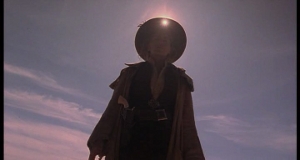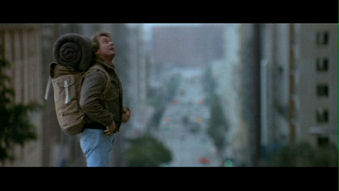
A lot of people rightly praise Sam Raimi’s Evil Dead trilogy, but I’ve always preferred his…”more mature” feels like an obscenely inaccurate phrase, so I’ll just call them his “middle-period” pieces. Between Evil Dead 2 and Spider-Man, Raimi struggled for mainstream success, feeling – like every decent genre director in the ’80s and ’90s – that niche audiences and cult success are all well and good…until you looked at the numbers. Besides, Universal wanted to create its own TV channel. Who better to make that happen than a writer/director/producer triple threat?
These struggles cost him fans and failed to win him the wide audience Hollywood’s power brokers and spreadsheet psychics insist every director must possess before they’re allowed to sit in the Front Room with the Grown Ups, where they might accidentally/on-purpose break the studio’s Nice Things (like, oh, I don’t know, say…a profitable superhero franchise). While Darkman and Army of Darkness are “kinder” and “gentler” films than either previous Dead movie (and easier to follow than the Great Black Mark on Raimi’s pre-Spider-Man career, Crimewave), I’m going to own up another Fanboy Heresy and admit I actually prefer them to the original Dead duology.
Not that I don’t love the Dead movies, but I prefer flicks with characters over flicks with mobile viscera containers (that just so happen to speak and/or emote). Why do you think I go out of my way to avoid “art house” or “Sundance Channel” films? Continue reading The Quick and the Dead (1995)

 Michael Bay has survived every epithet in the Movie Critic’s Mean Word Handbook. We’ve called him a “hack” and a “bullshit artist.” We’ve called him “the Devil,” “the Antichrist,” and even honored him with the title “American Uwe Boll.” All of these characterizations are false, missing the quintessence of Bay. In their rush to (rightly) condemn the man’s aesthetic failings, critics have miss the essential and obvious point: Like a great many evil things, Bay is first and foremost a creature of the late 1990s, an artistic distillation of that time, with all the glory and the horror that implies.
Michael Bay has survived every epithet in the Movie Critic’s Mean Word Handbook. We’ve called him a “hack” and a “bullshit artist.” We’ve called him “the Devil,” “the Antichrist,” and even honored him with the title “American Uwe Boll.” All of these characterizations are false, missing the quintessence of Bay. In their rush to (rightly) condemn the man’s aesthetic failings, critics have miss the essential and obvious point: Like a great many evil things, Bay is first and foremost a creature of the late 1990s, an artistic distillation of that time, with all the glory and the horror that implies.  They Live is one of those unfortunately good movies that cannot be adequately analyzed without betraying the very elements designed to entrance first time viewers and inspire the unfettered love that those of us who’ve seen the movie far too many times still hold. As such, standard Spoiler Warnings apply. All bastards unfortunate enough to have never experience a context-free viewing of this picture are hereby placed On Notice. You’ve been warned. They Live, We Sleep.
They Live is one of those unfortunately good movies that cannot be adequately analyzed without betraying the very elements designed to entrance first time viewers and inspire the unfettered love that those of us who’ve seen the movie far too many times still hold. As such, standard Spoiler Warnings apply. All bastards unfortunate enough to have never experience a context-free viewing of this picture are hereby placed On Notice. You’ve been warned. They Live, We Sleep.